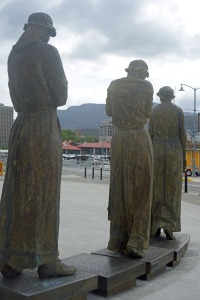As we travelled to Australia in Business Class this time, a decision made because of age and infirmity (not mine), I pondered on the journey my ladies took in such different circumstances almost two hundred years ago. Our journey with a five hour stop-over took around 30 hours, their’s took five months.

Now as a child, I travelled to Singapore by liner, which took three weeks and that was quite enjoyable. I remember a library, entertainments, reasonable food, interesting ports of call. I also recall on the return journey a storm so wild that it damaged our ship. Waves crashed over the ship as it fell into deep troughs of water, everything slid about, seasick passengers took to their beds. I never felt in danger, but imagine a ship a fraction of the size, less than 1% of the size. Wood and sail, without glass portholes, without proper sanitation, with only salt water for washing and no way to dry clothes other than hanging from the ropes.
In Business Class we were plied with tasty and fresh six course meals. My ladies had weevily, hard ship’s biscuit, peas which had to be boiled and still didn’t soften, meat from a barrel, often rancid and of poor quality. Water drawn from the Thames and stored for five months in barrels. Who knows what wildlife and bacteria grew in it during that time. And yet, they survived. They suffered dreadful seasickness, constipation and its opposite, being soaked from rain and sea and sun-stroke from a ship without shade.
We were cocooned in a lie-flat seat, isolated from our fellow passengers by a cunningly designed pod. They had to dress and wash in public, they slept on beds attached to the side of the ship, taking every roll of the vessel, however small or big. Yet they survived.The human spirit is strong.
As an eight-year-old child, I was preyed upon by a paedophile sailor, luckily I escaped with only terror and an abiding anger. My ladies would have had little protection from sailors unless their naval surgeon was vigilent and determined to protect them.
On arrival they were faced with an unknown future, at the mercy of their masters and mistresses , on an island at the very fringe of empire and civilisation. One thing they could be certain of – they would have no rights, no redress. For they were desribed as ‘notorious strumpets and dangerous girls.’
, on an island at the very fringe of empire and civilisation. One thing they could be certain of – they would have no rights, no redress. For they were desribed as ‘notorious strumpets and dangerous girls.’
 This new installation on Hobart’s Harbour at last pays tribute to the women who helped make Australia. I am proud of my husband’s 3 times great-grandmother, Ellen Fitzgerald. Her ship, Henry, is commemorated on the plinth. Here is the embodiment of my charaters Sarah, Helen with her baby, and Nora, personified by an Irish artist, in recognition that so many poor women were sent from Ireland. Be proud of them.
This new installation on Hobart’s Harbour at last pays tribute to the women who helped make Australia. I am proud of my husband’s 3 times great-grandmother, Ellen Fitzgerald. Her ship, Henry, is commemorated on the plinth. Here is the embodiment of my charaters Sarah, Helen with her baby, and Nora, personified by an Irish artist, in recognition that so many poor women were sent from Ireland. Be proud of them.
 Current research, which I am honoured to have taken part in, now recognises that many of the women fared badly. While most married, those marriages were often unsuccesful. Less than 40% reared families and fewer survived to a ripe old age. Many died in the pauper home or asylum. Many resorted to drink to numb their memories or their harsh lives. The tales of the orphan children and how they were treated is a story for another day.
Current research, which I am honoured to have taken part in, now recognises that many of the women fared badly. While most married, those marriages were often unsuccesful. Less than 40% reared families and fewer survived to a ripe old age. Many died in the pauper home or asylum. Many resorted to drink to numb their memories or their harsh lives. The tales of the orphan children and how they were treated is a story for another day.

Great blog, Rosemary. Thank you for sharing this with us.
LikeLiked by 1 person
A very moving blog. It’s great that historical novelists can record these stories of ordinary people thrown into extraordinary events… so that the world doesn’t forget.
LikeLiked by 1 person